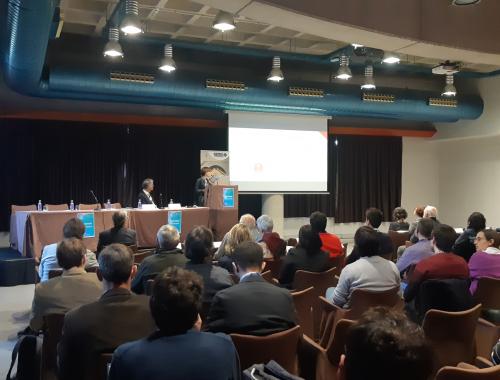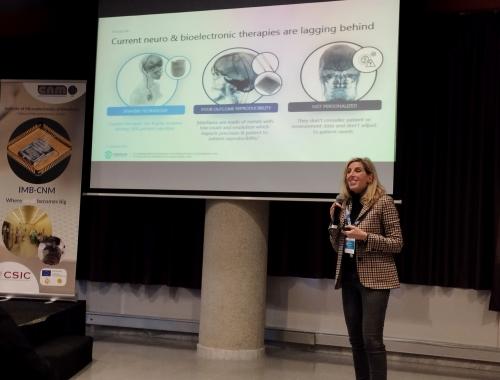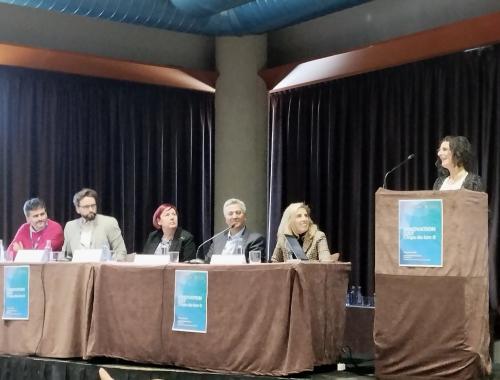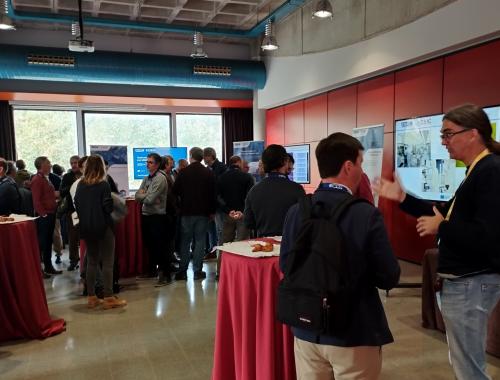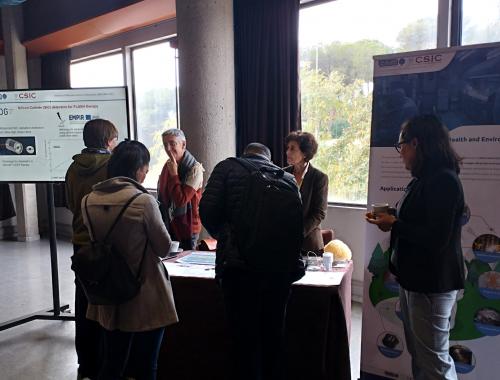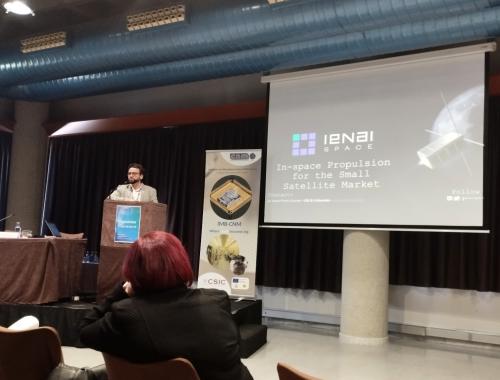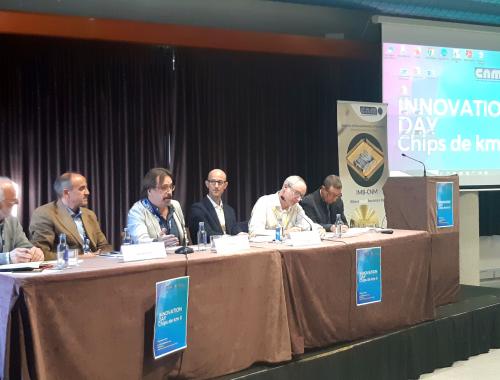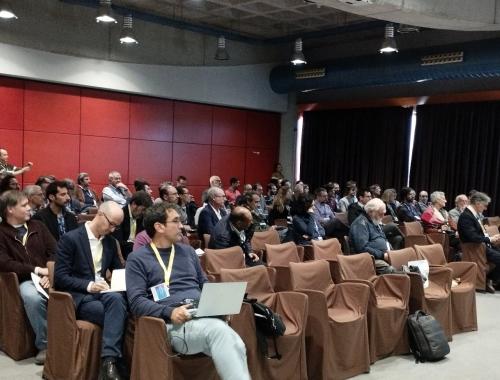Almost a hundred attendees at Innovation Day: 0 km Chips
The Institute of Microelectronics of Barcelona (IMB-CNM, CSIC) has organized the first edition of the Innovation Day: 0 km Chips on transfer with industry, to share needs and establish possible ways of collaboration between the institute and the surrounding companies.
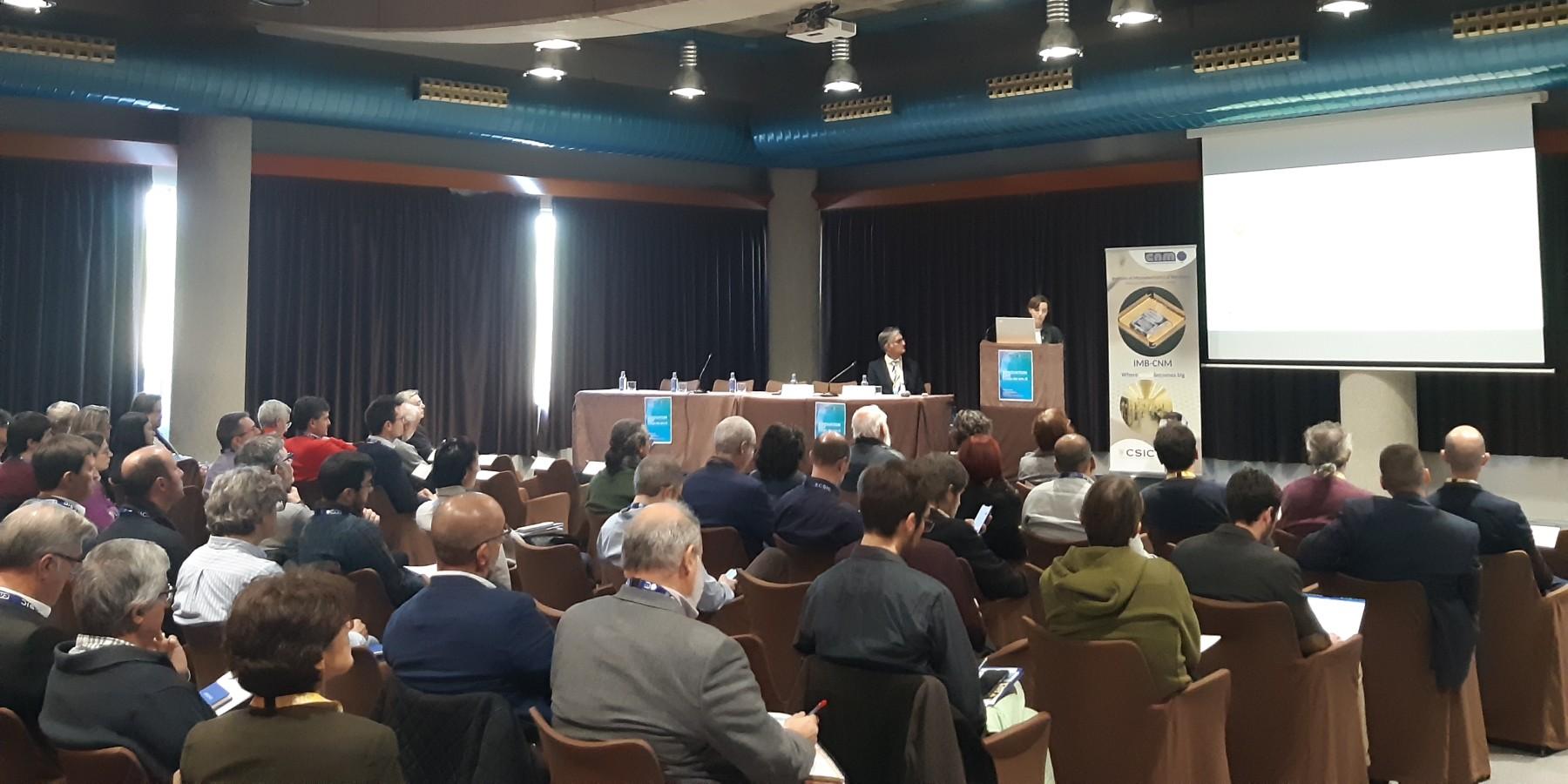
The first meeting on innovation in microelectronics organized by the Institute of Microelectronics of Barcelona (IMB-CNM, CSIC) was held at the Hotel Exe Campus (Cerdanyola del Vallès) on November 23. The meeting, which welcomed almost a hundred people, including companies, business groups and industry agents, has valued the technologies developed by the institute and has highlighted the transfer of knowledge carried out by the reference center in research and development in micro and nano technologies.
During the event, which included interventions by the CSIC's Vice President of Knowledge Transfer, Ana Castro, and the director of the IMB-CNM, Luis Fonseca, the transfer data of recent years was released and they reviewed the different forms of collaboration with the industry that have given rise to success stories. In the afternoon session, a round table was held where the potential of chips as a vector for collaboration and innovation was analysed.
Once the plenary sessions had concluded, some twenty attendees came to visit the IMB-CNM facilities, including its Micro and Nanofabrication Clean Room. The Clean Room is a unique open access facility in southern Europe due to its characteristics, where work can be done at micro and nanometric scales to carry out research on silicon technologies and other semiconductor materials. The range of applications it covers is very wide, including biomedical, environment, food, energy and mobility, security, communications and consumer electronics.
Collaborations that became transference success stories
The act has sought to establish ways of collaboration with the industry and generate a dialogue between the needs and possibilities of microelectronics in sectors such as health, environment, mobility, energy, space, physics, etc. To give an example of each, we have had Carmen García (CSIC, CERN and Alivaba Systems S.L.), Fernando Monterde Aznar (Head of Development Induction Cooktops BSH), Sergi Gassó (CEO of Fuelium), Daniel Pérez Grande (CEO of IENAI Space) and Carolina Aguilar (CEO of INBRAIN Neuroelectronics), who have shared their experience of collaboration with the IMB-CNM.
CERN
The IMB-CNM Radiation Detectors Group (RDG) has worked with the international team at CERN to develop innovative sensors to improve the Large Hadron Collider b (LHCb) experiment, which allows the study of the basic components of matter . The IMB-CNM has been involved in different high-energy physics experiments with CERN over the last 20 years, including the subdetector incorporated into the ATLAS experiment, developed in 2014. The devices have been developed in the IMB-CNM Clean Room and they are still running. In addition, the basic research developed for CERN has allowed the creation of the technological spin-off Alibava Systems S.L. and the development of devices for medical and security applications.
BSH - Bosch Home Appliances Group
The collaboration with the IMB-CNM arose in 1998 when research staff from the BSH/Balay induction cooker development group and the IMB-CNM Power Devices and Systems (PDS) group met at a national congress on industrial electronics. The company was developing the first compact induction cookers and was looking for a solution for the power devices that they incorporated and that had to withstand high temperatures. The PDS group had detailed knowledge of the physics of these devices and were able to provide a detailed study of their operating limits for the application of compact induction cookers within the framework of a National Plan project with BSH and the University of Zaragoza.
Since then, the collaboration has been maintained with direct contracts with the company and participation in European projects, such as iRel4.0. In addition to providing a transfer of specialized doctoral personnel trained at the IMB-CNM to BSH, carrying out specific training courses for the company's engineering team or filing joint patents. Currently, both teams are focused on the study of the possible failure mechanisms of power devices under real operating conditions and involve new generations of research and engineering staff at both institutions.
FUELIUM
IMB-CNM spin-off company established in 2015, which develops and markets sustainable energy solutions to power single-use electronic devices, based on interaction with the IMB-CNM research team that invented the technology. Unlike batteries, these ecological paper batteries only generate the amount of energy necessary for each application, they are activated when they come into contact with a liquid and they do not contain heavy metals that are harmful to health. They are mainly made of paper, carbon, and biodegradable metals.
IENAI Space
The Madrid start-up created in 2019, has developed the first Spanish nanosatellite space booster that has an electrospray booster based on micro and nanomechanized chips manufactured in the IMB-CNM Micro and Nanofabrication Clean Room. IENAI Space thus becomes the first Spanish company focused on space mobility thanks to the propulsion technology developed for the Alpha microlauncher, which was successfully launched last October and will equip the Athena technology demonstrators.
INBRAIN Neuroelectronics
Spin-off created in 2020 with the aim of treating brain diseases with graphene-based implants that offer a therapeutic response adapted to the clinical condition of each patient. The IMB-CNM develops graphene transistors in its Micro and Nanofabrication Clean Room, which are capable of detecting extremely low frequencies in the brain. With the participation of the CSIC.
Innovation Day plenary sessions
- The Innovation Day: 0 km Chips began the registration of participants at 9:30 in the morning and at 10 a.m. the inaugural session began, the institutional welcome by Ana Castro and Luis Fonseca.
- At 10:45, Isabel Gavilanes, from the Area of Commercial Strategy, Internationalization and Promotion of EBTs, CSIC Catalonia Delegation - Vice-presidency of Knowledge Transfer, CSIC, reviewed the last years of transfer at the IMB-CNM and at the CSIC with the talk "Where we are: indicators of technology transfer at the IMB-CNM".
- After the coffee break, representatives of collaborating companies presented different cases in the plenary session "What we have done: transfer successes over the years". Carolina Aguilar, INBRAIN Neuroelectronics; Carmen García, CERN; Fernando Monterde Aznar, BSH - Bosch Home Appliances Group; Sergi Gassó, FUELIUM; and Daniel Pérez Grande, IENAI Space.
- After lunch, Pere Alemany, from the Barcelona Chamber of Commerce, was in charge of moderating the round table "Chips as a vector of innovation and collaboration", which included contributions from José David Domènech, VLC Photonics; Manuel Lozano, director D+T Microelectronics AIE and research professor at IMB-CNM; Marcos Martínez, coordinator of the AMETIC Microelectronics Working Group; Miguel Ángel Pérez Costero, Senior Consultant at ITAINNOVA; and José Antonio Plaza, research professor at IMB-CNM.
- In parallel, five tables were organized with material on the technological offers available from the institute. The tables were organized according to the thematic axes of the IMB-CNM, the technology unit and D+T Microelectronics. The dinof each axis were in charge of giving the appropriate information to all attendees who approached the tables. The exhibitors were the Technology Unit and Micro and Nanofabrication Clean Room (ICTS), the Energy and Mobility Thematic Axis, the Health and Environment Thematic Axis, the Physics Frontiers and Civil Security and D+T Thematic Axis Microelectronics A.I.E.





